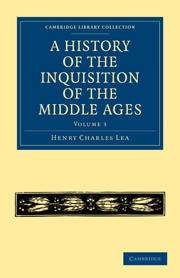Book contents
- Frontmatter
- Contents
- BOOK III SPECIAL FIELDS OF INQUISITORIAL ACTIVITY
- CHAPTER I THE SPIRITUAL FRANCISCANS
- CHAPTER II GUGLIELMA AND DOLCINO
- CHAPTER III THE FRATICELLI
- CHAPTER IV POLITICAL HERESY UTILIZED BY THE CHURCH
- CHAPTER V POLITICAL HERESY UTILIZED BY THE STATE
- CHAPTER VI SORCERY AND OCCULT ARTS
- CHAPTER VII WITCHCRAFT
- CHAPTER VIII INTELLECT AND FAITH
- CHAPTER IX CONCLUSION
- APPENDIX OF DOCUMENTS
- INDEX
CHAPTER I - THE SPIRITUAL FRANCISCANS
Published online by Cambridge University Press: 29 August 2010
- Frontmatter
- Contents
- BOOK III SPECIAL FIELDS OF INQUISITORIAL ACTIVITY
- CHAPTER I THE SPIRITUAL FRANCISCANS
- CHAPTER II GUGLIELMA AND DOLCINO
- CHAPTER III THE FRATICELLI
- CHAPTER IV POLITICAL HERESY UTILIZED BY THE CHURCH
- CHAPTER V POLITICAL HERESY UTILIZED BY THE STATE
- CHAPTER VI SORCERY AND OCCULT ARTS
- CHAPTER VII WITCHCRAFT
- CHAPTER VIII INTELLECT AND FAITH
- CHAPTER IX CONCLUSION
- APPENDIX OF DOCUMENTS
- INDEX
Summary
In a former chapter we considered the Mendicants as an active agency in the suppression of heresy. One of the Orders, however, by no means restricted itself to this function, and we have now to examine the career of the Franciscans as the subjects of the spirit of persecuting uniformity which they did so much to render dominant.
While the mission of both Orders was to redeem the Church from the depth of degradation into which it had sunk, the Dominicans were more especially trained to take part in the active business of life. They therefore attracted the more restless and aggressive spirits; they accommodated themselves to the world, like the Jesuits of later days, and the worldliness which necessarily came with success awakened little antagonism within the organization. Power and luxury were welcomed and enjoyed. Even Thomas Aquinas, who, as we have seen, eloquently defended, against William of Saint-Amour, the superlative holiness of absolute poverty, subsequently admitted that poverty should be proportioned to the object which an Order was fitted to attain.
It was otherwise with the Franciscans. Though, as we have seen, the founders determined not to render the Order a simply contemplative one, the salvation of the individual through retreat from the world and its temptations bore a much larger part in their motives than in those of Dominic and his followers. Absolute poverty and self-abnegation were its primal principles, and it inevitably drew to itself the intellects which sought a refuge from the temptations of life in self-absorbing contemplation, in dreamy speculation, and in the renunciation of all that renders life attractive to average human nature.
- Type
- Chapter
- Information
- A History of the Inquisition of the Middle Ages , pp. 1 - 89Publisher: Cambridge University PressPrint publication year: 2010First published in: 1888

